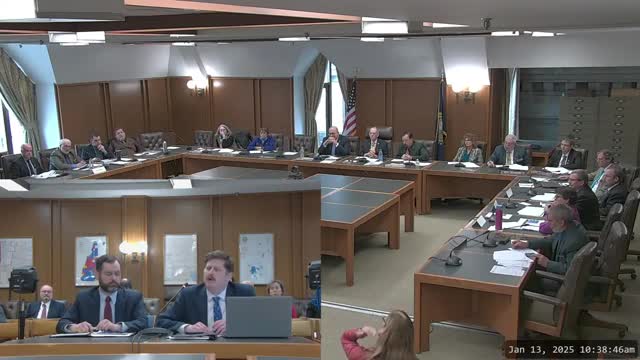Policy staff explains New Hampshire renewable portfolio standard: how RECs, classes and ACPs work
Get AI-powered insights, summaries, and transcripts
Subscribe
Summary
Josh Elliott of the Department of Energy gave a technical walkthrough of the state Renewable Portfolio Standard (RPS): how renewable energy certificates (RECs) are defined, class categories, compliance mechanics, the 2025 25.2% target, and the alternative compliance payment structure.
Josh Elliott, director of policy and programs at the New Hampshire Department of Energy, gave the committee a detailed explanation of the state Renewable Portfolio Standard, the system of renewable energy certificates (RECs) and how suppliers comply.
Elliott explained RECs are an accounting tool that separates the renewable attributes of generation from the physical electrons that flow on the grid. "A REC is equal to one megawatt hour of electricity production," he said, describing how RECs are minted and traded in a regional market and then retired for compliance. The statute divides REC supply into classes tied to technology and vintage: class 1 (new qualifying resources, with a thermal subset for useful heat), class 2 (solar), class 3 (existing biomass and methane), and class 4 (existing small hydro). Each class has distinct eligibility conditions in RSA 363-F.
For compliance year 2025, Elliott said the statute requires the equivalent of 25.2 percent of retail sales to be matched with RECs. He gave a concrete example: a supplier that sold 1,000 megawatt hours in a compliance year would need to obtain and retire 252 total RECs to meet the 25.2 percent target; that total must also satisfy the class-specific counts the statute requires. The program allows an alternative compliance payment (ACP) when RECs are scarce or trading prices spike; Elliott described the ACP as a statutory price cap that prevents runaway REC prices and noted ACPs are indexed for inflation — classes 3 and 4 by CPI and classes 1 and 2 by half of CPI.
Elliott reviewed the Renewable Energy Fund, which receives ACP revenue and funds rebate and grant programs (commercial solar, residential and commercial wood pellet incentives, low/moderate income solar grants, and a municipal solar program). He told the committee the RPS escalator reached its statutory plateau in 2025 and the department will undertake a statutory review of the program at the legislature’s direction. "We are going to be undertaking a review," he said, adding staff will provide the committee with analysis and alternatives for how the RPS can be adjusted to meet state goals while managing cost impacts.
Committee members asked about REC trading across state lines, banking and expiration rules for RECs, and how the RPS interacts with industry economic development. Elliott said RECs trade regionally, can be banked subject to statutory limits, and that the department will provide further data on trade flows and the program’s economic impacts on state businesses.
